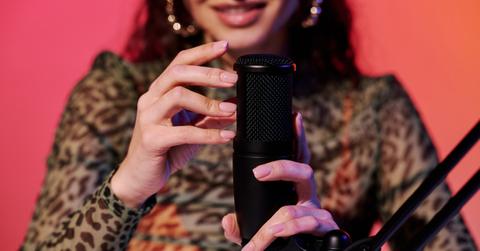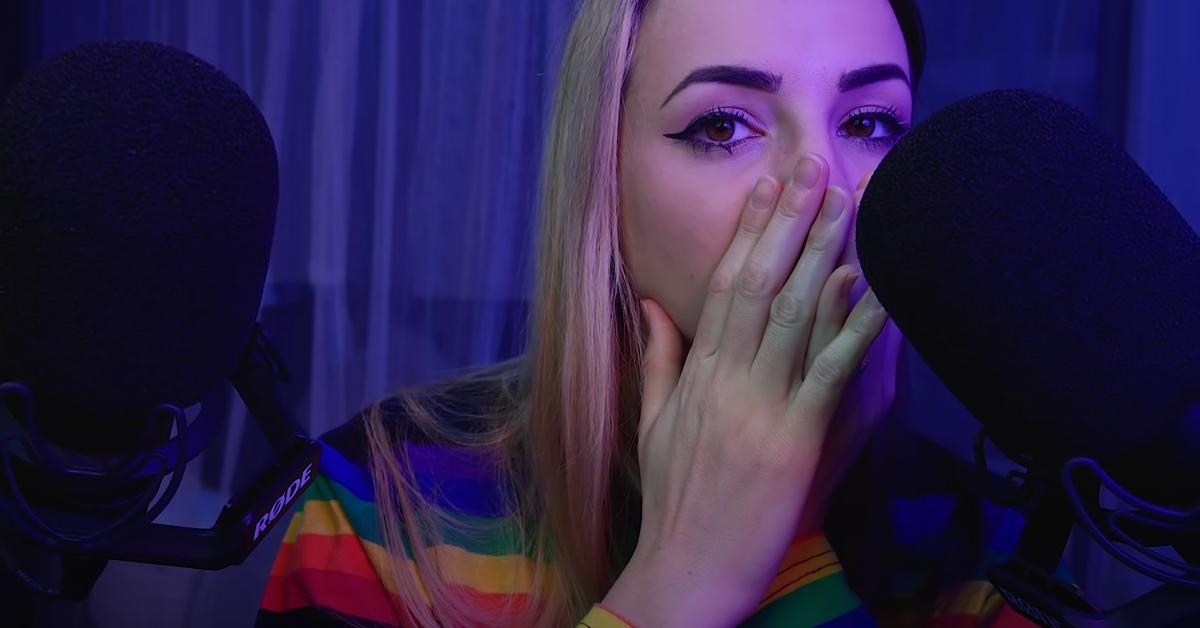Whispers, Tingles, and “Happy Little Trees” — Physiologist and ASMRtist on the Health Benefits of ASMR (Exclusive)
Published July 25 2023, 1:44 p.m. ET

Have you ever felt a strangely euphoric sensation wash over you, gently tingling your scalp, your neck, and your spine? Maybe it suddenly hit you in a salon chair, just as your hairdresser leaned in to trim those overgrown bangs. Snip, snip. Or perhaps the feeling materialized at your last yearly physical. "Now, take a deep breath for me," the doc whispered, softly pressing the stethoscope's diaphragm into the center of your back. Chills. Instant chills.
And hey, don't be embarrassed if it's Kylie Jenner's slow "heart resonance" voice (as put by English-language speaking coach Jade Joddle) does it for you. Her Kylie Cosmetics unboxing videos often feature soft-spoken voiceovers, crisp cardboard folds, and delicious tapping sounds (acrylic nails on plastic is heavenly).
Many of you — roughly 20 percent of you — are surely nodding your heads with a smile, familiar with the pleasurable, mystifying sensation known as ASMR. Nebraska Medicine describes Autonomous Sensory Meridian Response as "a tingling, static-like, or goosebumps sensation in response to specific triggering audio or visual stimuli. These sensations are said to spread across the skull or down the back of the neck and, for some, down the spine or limbs."
Since cybersecurity expert Jennifer Allen coined the acronym in 2010, hoping to give the peculiar corner of the internet some credibility, ASMR has become a mainstream phenomenon. From resurfaced episodes of Bob Ross' The Joy of Painting (he is "the Godfather of ASMR," after all) to viral "personal attention" role-play videos to W Magazine's celebrity ASMR interview series, the internet is brimming with content intended to induce "brain orgasms" — a controversial term many ASMR enthusiasts detest, as ASMR is not sexual in nature.
Considering this, ASMR content was once deemed taboo (perhaps you watched ASMR videos in secret a decade ago, promptly deleting your internet history as shame penetrated your psyche). It was a misunderstood human experience in the aughts and 2010s. And though it's still something of a mystery — as the first peer-reviewed ASMR research study was only published in 2015 — one thing's certain: ASMR is helping people all over the world feel good in their minds and bodies. But are these rare, tranquil moments of pleasure and calm actually providing health benefits? Those who have never experienced ASMR may think it's just some cyberspace woo-woo, but researchers and content creators alike beg to differ.
Via email, Green Matters spoke exclusively with physiologist and trailblazing ASMR researcher Dr. Craig Richard and YouTube sensation Gibi ASMR about the science behind ASMR, its selective nature, and its connection to mental health and sleep. Without further ado, let's get cracking, tapping, and scratching, fellow tingleheads.

Heart, health, and happiness: Here's what ASMR does to the body and mind.
Can watching a mundane video of someone folding laundry, typing on a keyboard, or applying lipgloss actually impact health? According to Shenandoah University professor Dr. Craig Richard (who loves a good eye exam), "biological changes during ASMR confirm that the relaxing effect is physiological and measurable."
During Dr. Richard's 2022 TED Talk, "The Brain Science (and Benefits) of ASMR," he referenced a study from the University of Sheffield in the U.K., relaying that people's heart rates are "significantly and effectively reduced" ("an average decrease of 3.14 beats per minute," according to the study) while watching ASMR videos.
The ASMR University founder tells Green Matters that another study has also found ASMR to correlate with a reduction of blood pressure.
A reduced heart rate is associated with relaxation, and can be achieved by going for a stroll, practicing breathing or stretching exercises, and performing "vagal maneuvers," per Medical News Today.
Many tingleheads will turn on an ASMR video — whether it be a cranial nerve exam role-play or a back massage montage — as they snuggle into bed, hoping to decompress and destress before their eyelids get heavy. As mentioned, this induced relaxation is associated with reduced heart rate and blood pressure, but what's going on in the brain?
A 2018 brain scan study "showed that specific areas of the brain are active when someone is experiencing ASMR and the tingles," Dr. Richard shares with Green Matters.
"Some of these brain regions include the medial prefrontal cortex, the insular cortex, and the nucleus accumbens. The activation of these brain regions in our study support the likely involvement of endorphins, serotonin, GABA, and oxytocin," he explains.
You chronically online readers (please, touch some grass) may be familiar with serotonin memes, which typically poke fun at the desperation for a serotonin boost. Serotonin is a hormone and monoamine neurotransmitter that influences memory, happiness, sleep, sexual desire and behavior, and hunger, as detailed by Cleveland Clinic. The "feel good" chemical is a biggie in terms of mood, but Dr. Richard believes oxytocin may be the star of the show when it comes to ASMR.
"The one most central to ASMR may be oxytocin, also known as the love hormone," he explains. "Behaviors that trigger oxytocin release are similar to the behaviors that trigger ASMR."
Curious about those behaviors? A 2014 study noted that "oxytocin is released in response to activation of sensory nerves during labor, breastfeeding, and sexual activity" as well as during "low intensity stimulation of the skin," like cuddling. (Still, we recommend ignoring the "whisper porn" and "braingasm" allegations.)
"Additionally, oxytocin is known to stimulate feelings of relaxation and comfort, which are similar to the feelings described when experiencing ASMR," Dr. Richard continues.
Considering low levels of both oxytocin and serotonin are associated with anxiety and depression, it's no wonder individuals with mental illnesses rely on ASMR for additional (not to mention accessible) support.
Popular YouTuber ASMR Glow — who boasts 1.77 million subscribers as of July 2023— previously told The Guardian that her content has helped stressed mothers, soldiers with PTSD, and individuals with sleep, anxiety, and depressive disorders. We asked Dr. Richard to expand on this.
"Most mental health conditions, such as anxiety, PTSD, depression, and insomnia are either caused by, or worsened by, stress and lack of sleep. Our preliminary data shows that the most common health benefits of ASMR are increased relaxation, lowered stress, and improved ability to fall asleep," he explains. "Being able to lower your stress and improve your sleep will be helpful to common conditions such as anxiety, PTSD, depression, and insomnia."
Gibi ASMR can attest to this. Not only has Gibi received warm, grateful messages from "soldiers with PTSD, people with autism who use [her] videos to practice eye contact, people with anxiety, depression, insomnia, stressed students, [and] parents with kids who can’t sleep," as mentioned in an interview with The Cut, but the limitless world of ASMR has helped her cope with her own anxieties, panic attacks, and sleep issues.
Desperate to self-soothe during anxious moments and sleepless nights, Gibi — whose legal name is Gina — began watching massage videos and makeup tutorials on YouTube. As she traveled farther and farther down the tingly rabbit hole, little 15-year-old Gibi discovered ASMR.
Over a decade later, Gibi has a sophisticated channel that offers diverse long-form content ranging from European candy mukbangs to elf ear surgery role-plays (yep, she's a cosplay queen), not to mention a massive following of almost 5 million subscribers as of July 2023. Though she's typically the one handing out the tingles, so to speak, Gibi knows ASMR will always be there when she needs a personal tingle fix.
"Knowing that ASMR is available as a tool I can lean on in times of increased anxiety is very reassuring to me," the Northwestern University grad tells Green Matters. "I have been able to create more of a concrete list of actions I can take when I am tense, stressed, worried, et cetera. It also has saved me so many hours of lost sleep. So. Many."
Aside from the mental health benefits of ASMR itself, Gibi has found joy and solace in the flourishing online ASMR community.
"ASMR was one of the first things I would seek intentionally to combat my panic attacks. The community also very much inspired and supported my decision to take mental health seriously," she says.
"I just thought something was weird and wrong with me, when the opposite was the truth. Being able to connect with quite literally thousands, if not millions, of others who can relate to those feelings was crucial. As a creator, I can't tell you how many incredibly thoughtful, vulnerable, and personal stories I have had the privilege of interacting with."
Why is ASMR so selective? Here's why you may never experience the magic of brain tingles.
So, you've watched color analysis videos, "mean popular girl does your makeup" role-plays, crack-tastic chiropractic sessions, "unintentional" ASMR compilations (here's a fantastic Kylie Jenner roundup), and Trisha Paytas' entire ASMR channel (we highly recommend Trish's unhinged Elizabeth Holmes role-play). Nothing. Tingle-less. What gives?
Dr. Richard offers possible reasons some people don't experience ASMR.
"This could be a simple biological reason, such as some people have different gene sequences that make them more sensitive to oxytocin or to other brain chemicals that are involved in their responses to ASMR triggers," the Sleep Whispers podcast host explains.
"Alternately, this could be due to a life experience, cultural influences, or even a current mindset that affects their ability to be relaxed by a specific trigger at that moment," he adds. "Science hasn’t revealed the exact reasons for such diverse responses to the same stimuli; and like most aspects of biology, it will probably have multiple causes and influences."
Gibi believes there may be a niche trigger out there for everyone.
"ASMR is more 'potent' for some people than others, but the beauty of it is that the genre is massive," she says. "I think there are types of ASMR that will work for everyone. It's just about searching around and testing out different voices, triggers, forms of content, et cetera. The options are virtually endless."
You never know, the Avon makeup application scene in Edward Scissorhands may just spark something! If not, don't worry, Trish has a role-play version of the 1990 scene.
ASMR research is still so fresh, so it'll likely be a while before somnologists and psychiatrists take it seriously as a treatment option, if ever. However, Dr. Richard is hopeful.
"I do believe that ASMR stimulation has great potential as a co-therapy to current treatments and may also be beneficial someday as its own treatment for reducing stress and improving sleep," he says. "Experiencing ASMR through videos or podcasts is mostly free, always available, and seems to be absent of negative side effects."
From the Zoë Kravitz-led Michelob ULTRA Pure Gold 2019 Super Bowl commercial to HBO's The White Lotus, ASMR is ironically louder than ever. We can only hope this mainstream stamp of approval inspires more questions, more research, and more creativity. Keep calm and tingle on!